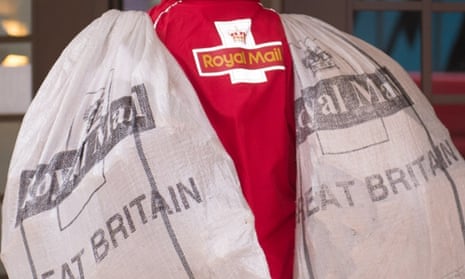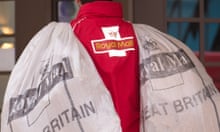The government could have made £180m more from the £2bn sale of Royal Mail last year but this would have involved “considerable risk”, a report commissioned by business secretary Vince Cable concluded.
The report by former city minister Lord Myners said the sell-off, which attracted huge controversy, was executed with “considerable professionalism” and the government and taxpayer achieved “significant value”. Labour said the review had a “very narrow remit” and did not take Royal Mail’s property assets into account.
MPs on the Business, Innovation and Skills committee argued that taxpayers lost out on up to £1bn because shares could been priced higher when the controversial privatisation of the 500-year-old institution went ahead, but Myners rejected this.
The government sold 60% of Royal Mail for 330p a share in October 2013. Myners says it would have been risky to price shares higher than 350p to 360p. He told Radio 4’s Today programme: “The panel of experts concluded that it’s possible that the Royal Mail could have been sold for 20p or 30p more a share but that would have taken considerable risk into the transaction.”
Ministers faced a barrage of criticism after shares leapt by 38% on the first day of trading, later peaking at 615p before falling back. Its shares are now trading just below 400p. In April, the National Audit Office (NAO) issued a scathing report arguing that the government’s desperation to sell Royal Mail cost taxpayers £750m in a single day.
However, Myners argued: “The market immediately after flotation was very non-standard. It was dominated by a couple of investors who basically bought any shares that were available and ... they subsequently sold those shares a few weeks later. So there was a very unusual market in Royal Mail immediately after the IPO.”
He added: “Royal Mail is now a private company quoted on the stock market and the price is pretty much where you would have expected it to be 12 months after the IPO.”
Labour’s shadow business secretary Chuka Umunna said: “Lord Myners was given a narrow and specific remit and was not asked, for example, to look at the valuation of Royal Mail’s property assets whose value the NAO concluded was not properly reflected in the sale. In spite of this, Lord Myners and his panel still conclude the taxpayer could have missed out to the tune of many millions of pounds.”
Labour sources noted that officials from the Department for Business, Innovation and Skills were involved in the review, saying: “It’s them marking their own homework.”
The report included recommendations for how stock market flotations should be conducted, including possibly selling assets in tranches.
When asked, however, whether a sale of Royal Mail in smaller chunks would have given ministers a better idea of what the price should have been, Myners said: “The government wanted to ensure than more than half of the shares in Royal Mail were sold because only by doing that would it become a genuinely private company.
“And investors were saying we will only buy shares in Royal Mail if the government is no longer the controlling shareholder, so these decisions need to be made within very practical constraints.”
He added in the report: “I regard the Royal Mail privatisation to have been a complex exercise executed with considerable professionalism. Many previous governments attempted to sell but failed. The sale was done against a backdrop of global economic uncertainty and a threat of industrial action, which go a long way towards explaining the cautious approach taken throughout the process.
“There were also some inherent complexities built into the transaction, such as a generous retail offer, which added to this caution. The government adopted conventional standard market practices built up over time.
“We do not believe that a price anywhere near the levels seen in the aftermarket could have been achieved at listing. The aftermarket conditions were extraordinary, unpredictable and did not reflect significant value ‘left on the table’ as some concluded at the time. The government and taxpayer achieved significant value.”
Cable thanked Lord Myners and his expert panel for this “important and insightful report”.
He added: “It contains a number of significant proposals which could make the general process of future sales more transparent. I would encourage financial regulators and those bringing companies to market to engage in this debate. In particular, they should explore how digital auctions could, in certain circumstances, make the sale process much more flexible.
“I also welcome his comment that the sale was executed with considerable professionalism and that any decision to try to have priced the shares higher would have been risky. We were right not to take that risk.”






Comments (…)
Sign in or create your Guardian account to join the discussion